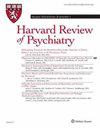Suicide Prevention in Your Pocket: A Systematic Review of Ecological Momentary Interventions for the Management of Suicidal Thoughts and Behaviors
IF 2.5
4区 医学
Q2 PSYCHIATRY
引用次数: 7
Abstract
Abstract Background This study reviews the evidence on ecological momentary interventions (EMIs) for managing and preventing suicidal thoughts and behaviors. Methods This review follows the Preferred Reporting Items for Systematic Reviews and Meta-analyses guidelines. Its protocol was registered in the PROSPERO database. We conducted a systematic literature search of five databases: PubMed, EMBASE, Web of Science, PsycInfo, and Cochrane library. The most recent search date was 10 September 2021. Results After screening and full-text review, 27 studies were included, totaling 19 different interventions. Many of the available interventions have not yet been clinically tested. Those that have undergone effectiveness evaluation (10 interventions) showed good rates of effectiveness and feasibility, with some exceptions. The most widely used intervention model is the safety plan, which allows the user to implement coping and distracting strategies in case of suicidal ideation. Conclusions Ecological momentary interventions provide certain advantages, such as their wide availability, versatility, and potential for customization. These interventions can be useful complements to traditional care, especially in situations in which face-to-face care is not possible. Evidence on the effectiveness of such interventions is still scarce. Furthermore, barriers limiting implementation in clinical practice remain. The constant advance of technology means that these interventions have great potential for improvement in the coming years.口袋里的自杀预防:自杀思想和行为管理的生态瞬时干预的系统回顾
背景本研究综述了生态瞬间干预(EMIs)在管理和预防自杀念头和行为方面的证据。方法本综述遵循系统评价和荟萃分析指南的首选报告项目。其协议已在普洛斯彼罗数据库中登记。我们对PubMed、EMBASE、Web of Science、PsycInfo和Cochrane图书馆这五个数据库进行了系统的文献检索。最近一次搜索日期是2021年9月10日。结果经过筛选和全文审查,纳入27项研究,共19种不同的干预措施。许多可用的干预措施尚未经过临床试验。经过有效性评估的干预措施(10项干预措施)显示出良好的有效性和可行性,但有一些例外。使用最广泛的干预模型是安全计划,它允许用户在出现自杀意念时实施应对和转移策略。结论生态瞬时干预具有广泛可用性、通用性和定制潜力等优势。这些干预措施可作为传统护理的有益补充,特别是在无法进行面对面护理的情况下。关于这类干预措施有效性的证据仍然很少。此外,限制在临床实践中实施的障碍仍然存在。技术的不断进步意味着这些干预措施在未来几年有很大的改进潜力。
本文章由计算机程序翻译,如有差异,请以英文原文为准。
求助全文
约1分钟内获得全文
求助全文
来源期刊

Harvard Review of Psychiatry
PSYCHIATRY-
CiteScore
7.50
自引率
0.00%
发文量
67
审稿时长
>12 weeks
期刊介绍:
The Harvard Review of Psychiatry is the authoritative source for scholarly reviews and perspectives on important topics in psychiatry. Founded by the Harvard Medical School''s Department of Psychiatry, the Harvard Review of Psychiatry features review papers that summarize and synthesize the key literature in a scholarly and clinically relevant manner. Topics covered include: Schizophrenia and related disorders; Mood disorders; Personality disorders; Substance use disorders; Anxiety; Neuroscience; Psychosocial aspects of psychiatry; Ethics; Psychiatric education; and much more.
In addition, a Clinical Challenges section presents a case with discussion from a panel of experts. Brief reviews are presented in topic-specific columns that include Cross-Cultural Psychiatry, History of Psychiatry, Ethics, and others.
 求助内容:
求助内容: 应助结果提醒方式:
应助结果提醒方式:


